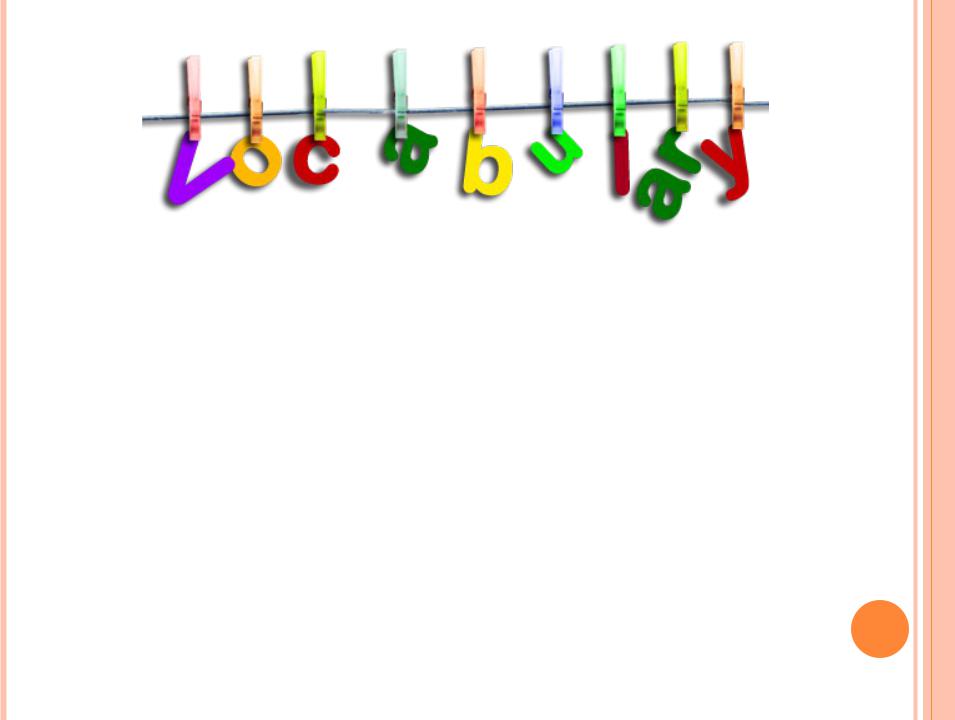
French_borrowings
.pdf
FRENCH BORROWINGS IN  ENGLISH VOCABULARY
ENGLISH VOCABULARY

The French influence on the English vocabulary had its greatest expansion in the period of the Middle English (1150 – 1500). During this time over 10,000 French words were adapted into the English language and about 75 per cent of these are still in use.
The reasons for that are, firstly, the bilingualism in England which had been prevailing since the Norman Conquest in 1066. Secondly, the English culture was regarded as inferior, i.e. it had more to gain from the language spoken by the upper classes.

Although, these extensive changes were important for the improvement of the English language, there were also disadvantages to it. The loss of native words, the different Middle English dialects, the need of a Standard English are only some examples for this.

Since the Norman Conquest in 1066 the French language became more and more important. The Normans (North-man) were descendants of the Danes and spoke French influenced by a Germanic dialect. They inhabited some parts in the north of France and adapted not only to the language, but also to the French culture.

Considering the French influence on the vocabulary, the Middle English period can be parted in 2 stages: an earlier and a later one. In the first phase from 1150 to 1250 there were less French words adopted into the English (about 900) than in the second phase. The borrowings show characteristics of the AngloNorman phonology and were mostly from the areas of the nobility (e.g. servant, messenger), literature (e.g. story, rime) and the church.

In the second stage (1250-1500) there was a rapid change in the prestige of the French language with a climax at the end of the 14th century. The Norman French developed its own peculiarities to the so called AngloNorman dialect, but it was more and more regarded as old-fashioned and
rustic compared to the Central French spoken in Paris.

The Normans bequeathed over 10,000 words to English (about three-quarters of which are still
in use today), including a huge number of abstract nouns ending in the suffixes “-age”, |
“- |
ance/-ence”, “-ant/-ent”, “-ment”, “-ity” and “-tion”, or starting with the prefixes “con-”, |
|
“de-”, “ex-”, “trans-” and “pre-”. |
|
Perhaps predictably, many of them related to matters of crown and nobility (e.g. crown, castle, prince, count, duke, viscount, baron, noble, sovereign, heraldry); of government and administration (e.g. parliament, government, governor, city); of court and law (e.g. court, judge, justice, accuse, arrest, sentence, appeal, condemn, plaintiff, bailiff, jury, felony, verdict, traitor, contract, damage, prison); of war and combat (e.g. army, armour, archer, battle, soldier, guard, courage, peace, enemy, destroy); of authority and control (e.g. authority, obedience, servant, peasant, vassal, serf, labourer, charity); of fashion and high living (e.g. mansion, money, gown, boot, beauty, mirror, jewel, appetite, banquet, herb, spice, sauce, roast, biscuit); and of art and literature (e.g. art, colour, language, literature, poet, chapter, question). Curiously, though, the Anglo-Saxon words cyning (king), cwene (queen), erl (earl), cniht (knight), ladi (lady) and lord persisted.

While humble trades retained their Anglo-Saxon names (e.g. baker, miller, shoemaker, etc), the more skilled trades adopted French names (e.g. mason, painter, tailor, merchant, etc). While the animals in the field generally kept their English names (e.g. sheep, cow, ox, calf, swine, deer), once cooked and served their names often became French (e.g. beef, mutton, pork, bacon, veal, venison, etc). Sometimes a French word completely replaced an Old English word (e.g. crime replaced firen, place replaced stow, people replaced leod, beautiful replaced wlitig, uncle replaced eam, etc). Sometimes French and Old English components combined to form a new word, such as the French gentle and the Germanic man combined to formed gentleman. Sometimes, both English and French words survived, but with significantly different senses (e.g. the Old English doom and French judgement, hearty and cordial, house and mansion, etc).

But, often, different words with roughly the same meaning survived, and a whole host of new, French-based synonyms entered the English language (e.g. the French maternity in addition to the Old English motherhood, infant to child, amity to friendship, battle to fight, liberty to freedom, labour to work, desire to wish) Over time, many near synonyms acquired subtle differences in meaning (with the French alternative often suggesting a higher level of refinement than the Old English), adding to the precision and flexibility of the English language.

The pronunciation differences between the harsher, more guttural Anglo-Norman and the softer Francien dialect of Paris were also carried over into English pronunciations. For instance, words like quit, question, quarter, etc, were pronounced with the familiar “kw” sound in Anglo-Norman (and, subsequently, English) rather than the “k” sound of Parisian French. The Normans tended to use a hard “c” sound instead of the softer Francien “ch”, so that charrier became carry, chaudron became cauldron, etc. The Normans tended to use the suffixes “-arie” and “-orie” instead of the French “-aire” and “-oire”, so that English has words like victory (as compared to victoire) and salary (as compared to salaire), etc.
There are just some of the kinds of inconsistencies that became ingrained in the English language during this period.
